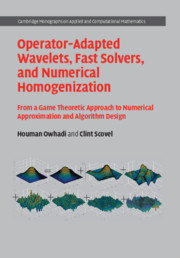Crossref Citations
This Book has been
cited by the following publications. This list is generated based on data provided by Crossref.
Budninskiy, Max
Owhadi, Houman
and
Desbrun, Mathieu
2019.
Operator-adapted wavelets for finite-element differential forms.
Journal of Computational Physics,
Vol. 388,
Issue. ,
p.
144.
Altmann, Robert
Henning, Patrick
and
Peterseim, Daniel
2021.
Numerical homogenization beyond scale separation.
Acta Numerica,
Vol. 30,
Issue. ,
p.
1.
Gin, Craig R.
Shea, Daniel E.
Brunton, Steven L.
and
Kutz, J. Nathan
2021.
DeepGreen: deep learning of Green’s functions for nonlinear boundary value problems.
Scientific Reports,
Vol. 11,
Issue. 1,
Hamzi, B.
Maulik, R.
and
Owhadi, H.
2021.
Simple, low-cost and accurate data-driven geophysical forecasting with learned kernels.
Proceedings of the Royal Society A: Mathematical, Physical and Engineering Sciences,
Vol. 477,
Issue. 2252,
Karniadakis, George Em
Kevrekidis, Ioannis G.
Lu, Lu
Perdikaris, Paris
Wang, Sifan
and
Yang, Liu
2021.
Physics-informed machine learning.
Nature Reviews Physics,
Vol. 3,
Issue. 6,
p.
422.
Owhadi, Houman
2022.
Computational graph completion.
Research in the Mathematical Sciences,
Vol. 9,
Issue. 2,
Harbrecht, Helmut
and
Multerer, Michael D.
2022.
Samplets: Construction and Scattered Data Compression.
SSRN Electronic Journal ,
Hauck, Moritz
and
Peterseim, Daniel
2022.
Multi-Resolution Localized Orthogonal Decomposition for Helmholtz Problems.
Multiscale Modeling & Simulation,
Vol. 20,
Issue. 2,
p.
657.
Ljung, Per
Maier, Roland
and
Målqvist, Axel
2022.
A Space-Time Multiscale Method for Parabolic Problems.
Multiscale Modeling & Simulation,
Vol. 20,
Issue. 2,
p.
714.
De Ceuster, F
Ceulemans, T
Cockayne, J
Decin, L
and
Yates, J
2022.
Radiative transfer as a Bayesian linear regression problem.
Monthly Notices of the Royal Astronomical Society,
Vol. 518,
Issue. 4,
p.
5536.
Brenner, Susanne C.
Garay, José C.
and
Sung, Li-Yeng
2022.
Multiscale Finite Element Methods for an Elliptic Optimal Control Problem with Rough Coefficients.
Journal of Scientific Computing,
Vol. 91,
Issue. 3,
Meng, Rui
and
Yang, Xianjin
2022.
Sparse Gaussian Processes for Solving Nonlinear Pdes.
SSRN Electronic Journal ,
Akian, Jean-Luc
Bonnet, Luc
OWHADI, HOUMAN
and
Savin, Eric
2022.
Learning "Best" Kernels from Data in Gaussian Process Regression. With Application to Aerodynamics.
SSRN Electronic Journal,
Sanz-Alonso, Daniel
and
Yang, Ruiyi
2022.
Finite Element Representations of Gaussian Processes: Balancing Numerical and Statistical Accuracy.
SIAM/ASA Journal on Uncertainty Quantification,
Vol. 10,
Issue. 4,
p.
1323.
Hauck, Moritz
and
Peterseim, Daniel
2022.
Super-localization of elliptic multiscale problems.
Mathematics of Computation,
Vol. 92,
Issue. 341,
p.
981.
Owhadi, H.
2023.
Gaussian process hydrodynamics.
Applied Mathematics and Mechanics,
Vol. 44,
Issue. 7,
p.
1175.
Dong, Zhaonan
Hauck, Moritz
and
Maier, Roland
2023.
An Improved High-Order Method for Elliptic Multiscale Problems.
SIAM Journal on Numerical Analysis,
Vol. 61,
Issue. 4,
p.
1918.
Chen, Yifan
Hou, Thomas Y.
and
Wang, Yixuan
2023.
Exponentially Convergent Multiscale Methods for 2D High Frequency Heterogeneous Helmholtz Equations.
Multiscale Modeling & Simulation,
Vol. 21,
Issue. 3,
p.
849.
Ming, Pingbing
and
Song, Siqi
2024.
Error Estimate of Multiscale Finite Element Method for Periodic Media Revisited.
Multiscale Modeling & Simulation,
Vol. 22,
Issue. 1,
p.
106.
Lang, Annika
Ljung, Per
and
Målqvist, Axel
2024.
Localized Orthogonal Decomposition for a Multiscale Parabolic Stochastic Partial Differential Equation.
Multiscale Modeling & Simulation,
Vol. 22,
Issue. 1,
p.
204.


